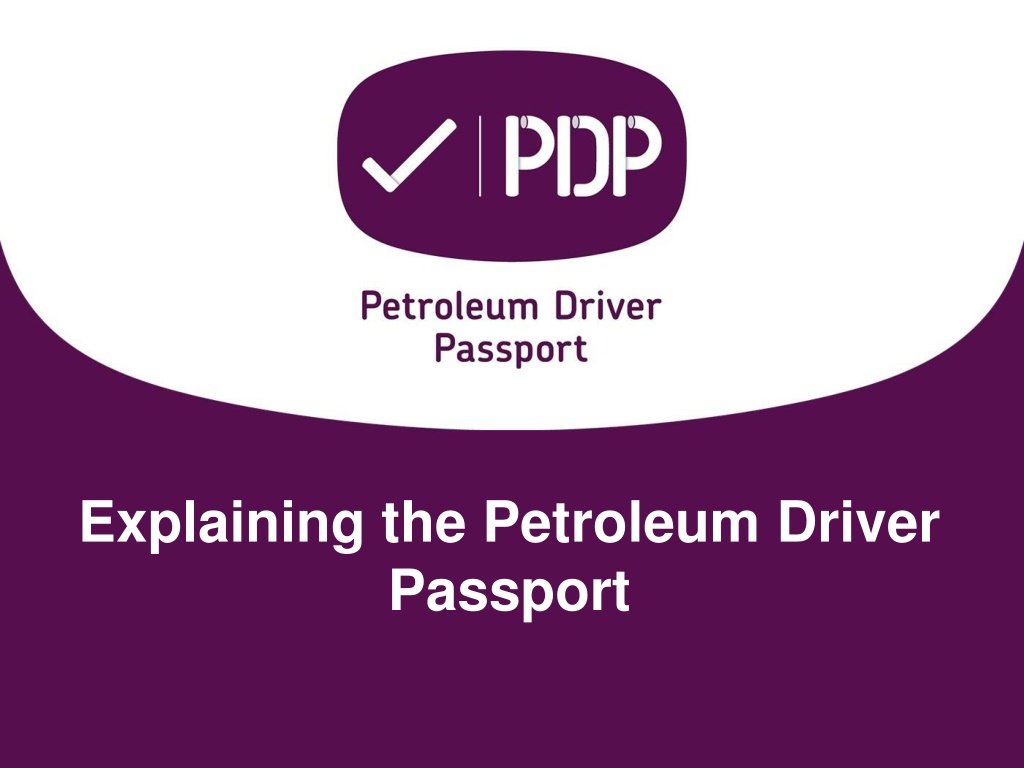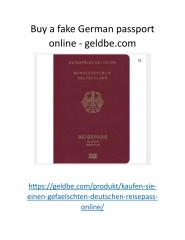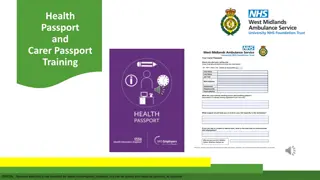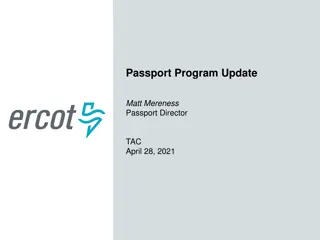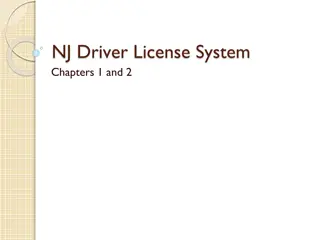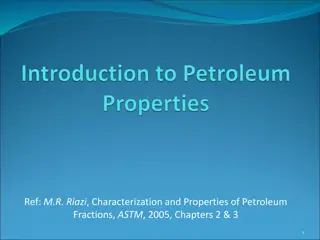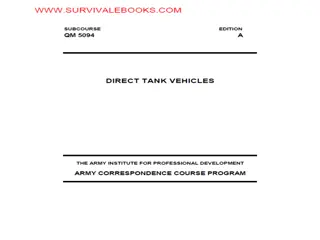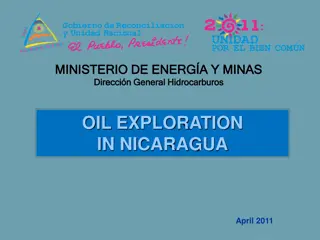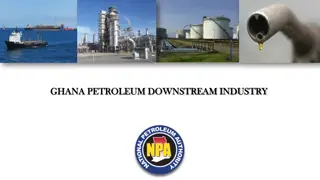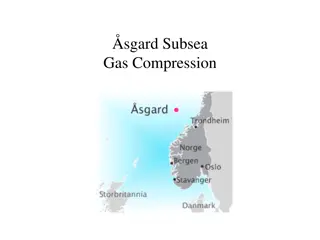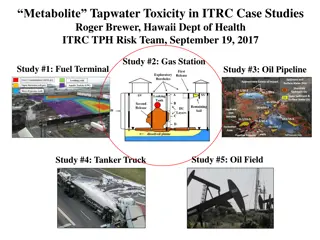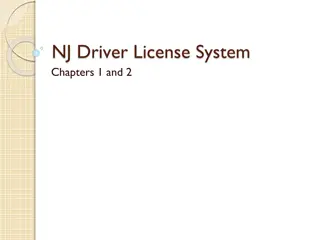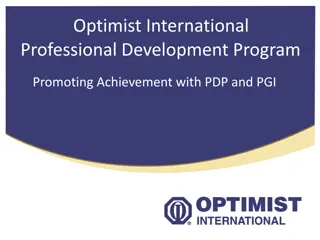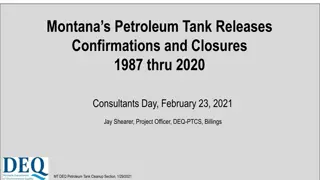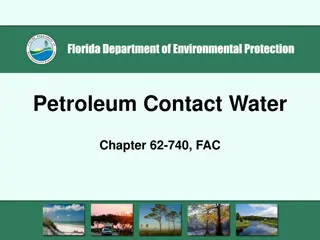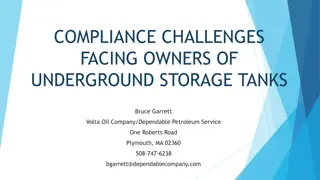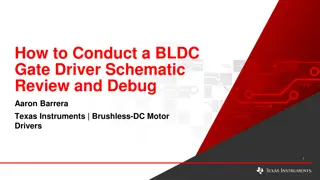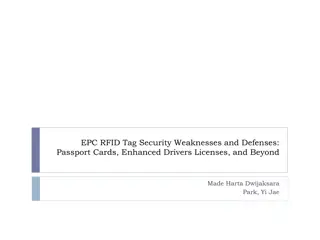Understanding the Petroleum Driver Passport (PDP) Program
The Petroleum Driver Passport (PDP) program aims to standardize training for petroleum tanker drivers in the UK, ensuring a consistently high level of classroom and practical training. The PDP is a driver card that all drivers must possess, regardless of employer or type of vehicles used. Industry-accredited checks for drivers and vehicles are part of the program, providing benefits for drivers and employers alike.
Download Presentation

Please find below an Image/Link to download the presentation.
The content on the website is provided AS IS for your information and personal use only. It may not be sold, licensed, or shared on other websites without obtaining consent from the author. Download presentation by click this link. If you encounter any issues during the download, it is possible that the publisher has removed the file from their server.
E N D
Presentation Transcript
Explaining the Petroleum Driver Passport
Contents Industry Background Origins and Development of the PDP How Does the PDP Work Enforcement Fee Structure Next Steps Summary Further Information 2
Industry Background Petroleum tanker industry can point to many examples of excellence in driver training However there is no common standard to which all drivers are trained, and currently: Drivers need no more formal training than an ADR ADR applies to many categories of driver and does not cover petroleum tanker specifics Some training is good but there is also inconsistency Terminal induction often has to fill a training gap ADR is classroom only training, tanker driving is a practical job 3
Purpose & Output Purpose: to deliver a consistently high level of classroom and practical training to all classes of petroleum tanker driver, sitting within a system of accreditation and enforcement by industry, delivered in the most cost effective manner, thereby ensuring all petroleum tanker drivers are trained to the same high standard Output: drivers who meet this standard and keep it up to date are issued with the Petroleum Driver Passport 4
Scope The PDP is an industry led and created initiative for everyone in the UK registered petroleum tanker business The PDP is a DRIVER card, all drivers should have a PDP regardless of employer, type of vehicles, grade(s) of petroleum product, or loading point The PDP definition of a terminal is anywhere that petroleum products are loaded We want all terminal operators, regardless of size, to mandate the PDP 5
Driver and Vehicle Assurance When the PDP is introduced, there will be industry accredited checks for both the driver and the vehicle: Safe Loading Pass: Vehicle Petroleum Driver Passport: Driver 6
Benefits of the PDP The PDP has benefits for all involved parties: Drivers: are consistently trained to a high standard Employers: have a standard against which to train all drivers, whether training is delivered in-house or externally. Scheme is linked to ADR and to driver CPC Terminals: know that the PDP means drivers are appropriately trained; where appropriate complements terminals competence assurance systems Training Centres: clear syllabus and strong PDP accreditation and assessment process Industry: reputational improvement, maintaining high standards in training and safety, industry providing its own pro-active code of practice 7
Origins of the PDP DECC, following the recommendations of the ACAS negotiated process, requested that UKDODF be reconvened. Suggested the group undertake a review of best practice in health and safety and driver training standards with the aim of incorporating this into a new industry-wide Code of Practice. Suggested that membership was drawn widely to cover - Retail, Commercial, Home Heat, Aviation & Marine deliveries Working with industry and relevant authorities Downstream Oil Distribution Forum: re-established in July 2012 to manage this work (first met 2004) at the request of DECC DODF is the industry body responsible for the PDP initiative 8
Downstream Oil Distribution Forum DODF has industry wide representation Haulage Companies (DHL, Hoyer, Norbert Dentressangle, Suckling, Suttons, Turners, Wincanton) Unions (Unite and URTU) Trade Associations (UKPIA, DFA, TSA, FPS, PRA, RHA, FTA) Major Employers/Terminal Operators (BP, GB Oils, Greenergy, Murco) Government and Regulatory Bodies (DECC, DfT, DSA, HSE, PELG) Sector Skills Councils (Cogent, Skills for Logistics) 9
Ownership & Management DODF has created and owns the PDP Designed how the PDP works Created the logo and branding Retained responsibility for managing the scheme and making future changes Owner and editor of the Scheme Manual which contains the detailed workings of the PDP DODF has appointed SQA to manage the PDP SQA already manage the ADR programme for DfT/DSA; we have worked with all parties to deliver PDP under the same contractual arrangements Approval of training centres, training content, trainers and assessors Management of the assessment process Passport issuance Management of all PDP records 10
What is the Petroleum Driver Passport? Training Standard Document covering all petroleum tanker driver required knowledge and practical skills Final Version now in place Specifies all requirements whether already covered in ADR or not PDP syllabus is the Training Standard minus those parts already covered in ADR PDP syllabus is arranged in one classroom PDP module and in a practical load, drive and tip assessment The Training Standard sets a minimum standard and operators are free to exceed it should they wish But the PDP is more than a Training Standard .. 11
What is the Petroleum Driver Passport? System of Accreditation and Enforcement SQA approve all activity within the scheme (Training Centres, Trainers, Assessors) Training Centres carry out the training to approved standards (can be in-house or third party organisations) SQA set the external assessments, Training Centres invigilate SQA employ External Verifiers to audit PDP activities PDP is enforced through the Terminal operators (see later) Other relevant authorities and operators made aware of the PDP (PELG, HSE, Police, VOSA, EA and others) The training standard and the system of accreditation and enforcement work together to create the PDP 12
How Does the PDP Work: Overview Five year cycle in line with driver ADR renewal cycle Classroom training and assessment Practical load, drive and tip assessment SQA managed assessment process SQA manage candidate results and issue passports Annual Refresher Training Classroom refresher training JAUPT compliance envisaged, so training hours can count towards driver CPC Annual load, drive and tip assessment SQA log all annual refresher training 13
Driver Full PDP Renewal Full renewal every five years aligned with individual driver ADR renewal date Classroom Training Delivered as the PDP Module The PDP Module covers knowledge relevant to all classes of petroleum tanker Delivered by existing ADR centres or newly accredited centres Drivers take the module and then sit an SQA managed assessment invigilated by the Training Centre, preferably on-line Industry sub sector knowledge is not part of the PDP Module or the assessment (not relevant to all) Sub sector knowledge and practical requirements are built into the Training Standard and designed to assist driver training when new to a sub sector Practical Training Practical assessment carried out to approved load, drive tip assessment sheet Practical assessors approved, may well be different from classroom assessors Pass/fail mark with results communicated to SQA by training centre/assessor 14
Driver Full PDP Renewal Successful completion of the classroom AND the practical assessment results in the issue of the Petroleum Driver Passport by SQA 15
Driver Annual Refresher PDP is gained through the five year assessed renewal, and maintained through annual refresher activity in each interim year Completion of a Classroom annual refresher, recapping on key points and updating on changes of content and emphasis SQA are informed that the refresher has taken place Completion of a load, drive and tip practical assessment with an approved PDP practical assessor SQA are informed that the practical assessment has taken place Practical assessment and classroom refresher are subject to SQA verification through a process of selective audit PDP website will contain suggestions for annual refresher content Annual refresher training can be undertaken as a JAUPT-approved course thus registering Driver CPC hours 16
Initial Passport Issue All drivers have 12 months to get a PDP Full passport if ADR to be renewed in the first 12 months Interim if ADR renewal is more than 12 months away Full renewal as already described Interim passport: Take an annual refresher classroom day in the first 12 months Take a pass/fail practical assessment Take the interim assessment module Interim assessment module covers the most critical points of the full assessment SQA manage the interim passport assessment as with the Full renewal SQA communicate pass/fail (instant result if on-line method used) Passport is valid until driver ADR renewal No difference in validity status, but interim cards coloured differently Routes to passport renewal summarised as follows: 17
Current Driver Employed in the industry (with ADR) If ADR up for renewal in Year 1 of the PDP scheme If ADR not up for renewal in Year 1 of the PDP scheme Driver NEW to the industry (with NO ADR) Driver NEW to industry (with ADR ) Route 2 Route 1 Follow Route 2 from point of joining PDP: and issue of full PD Passport classroom training written assessment practical assessment Initial assessment: classroom training written assessment (subset of 5 year PDP) practical assessment and issue of interim passport At point of joining at any time (not just in Year 1 of scheme) follow Route 1 until ADR up for renewal, then revert to Route 2 Year 1 Annual refresher training and practical assessment Annual refresher training and practical assessment until ADR up for renewal, then take Route 2 Year 2 Annual refresher training and practical assessment NB: the above means Route 1 must continue to be available after Year 1 of the PDP scheme. Year 3 Annual refresher training and practical assessment Routes to Interim and Full Petroleum Driver Passport Year 4 Annual refresher training and practical assessment Year 5 renewal of PDP: classroom training written assessment practical assessment and re-issue of full PD Passport NB: in line with ADR renewal timescale 18
Re-Validation and Lost Cards If the annual refresher training is not kept up to date the PDP will become invalid An invalid card cannot be used There may be good reasons for allowing cards to become inactive (e.g. driver duties change) PDP can be re-activated by: Sitting a classroom annual refresher Taking a pass/fail load, drive and tip practical assessment Registering successful completion with SQA Lost cards can be replaced by contacting SQA 19
Industry Sub Sectors and the Practical Assessment Drivers often work on more than one of the five industry sub sectors (Retail, Commercial, Home Heat, Aviation & Marine) Only one practical assessment is required for the five year renewal/annual practical refresher The five year and the annual refresher should be taken on the sub sector in which the driver most frequently works [continued on next slide] 20
Industry Sub Sectors and the Practical Assessment continued If a driver is new to a sub sector, a practical load, drive and tip assessment should be carried out in that sub sector If this is carried out within 4 months of the anniversary date for annual refresher this should be reported to SQA and will count towards a driver s 5 year cycle of annual refresher training. If this practical assessment is carried out outside of the 4 month window it does not need to be reported to SQA but is subject to external verification. The practical assessment would need to be repeated when the annual refresher is due. 21
Training Centres: Existing All Training Centres need to be approved through SQA Centres pay an initial approval fee followed by annual approval fee The training centre, the trainers, the course content and practical assessors all need to be approved through SQA Centres are subject to verification checks by SQA Existing centres can register for new activities if they wish (e.g. annual refresher and practical training) 22
Training Centres: New New training centres can apply to SQA for approval Initial application fee followed by annual approval Verification and approval of training content, trainers and assessors as for existing centres New centres can select which PDP activities to register for: PDP Module Interim passport issue Practical assessment only Annual refresher and Re-validation training Combinations of the above 23
How the PDP Works: Summary The PDP has been set up to maximise a number of important benefits: Delivery of a consistent level of training across the industry Drivers have relevant knowledge of all sub sectors, more easily transferable between sectors Strong link to ADR, delivered to same renewal cycle and under the ADR contract PDP classroom syllabus delivered as the PDP Module, for content not already covered in ADR The extra module can be delivered in most ADR renewal classes without requiring an extra day Annual refresher training can be undertaken as Driver CPC compliant training 24
Enforcement Strategy Government encourages: creative, non-regulatory solutions to achieve desired policy outcomes and enable businesses, individuals and other organisations to get involved in delivering the desired outcomes; and Businesses to take greater responsibility for the way they deal with their obligations under the law in ways that suit their circumstances. The PDP and the enforcement arrangements that underpin it are an excellent example of industry taking the initiative and working with Government to provide its own solution. 25
Primary Enforcement: Terminals The primary point of enforcement for this industry code of practice is at the Terminals by Terminal Operators and independent legal advice has confirmed it is lawful to do so for drivers of UK registered vehicles PDP definition of a terminal is anywhere petroleum tankers drivers load designated product Terminal operators are required to demonstrate due diligence in allowing rack access The PDP is proof of competence as a petroleum tanker driver Terminal Operators will request proof of PDP at induction before granting loading pass (terminal induction will still be required) Terminal operators will spot check the PDP in line with their own spot check procedures Terminal operators will phase in the mandating of the PDP: First 12 months: card is recognised but not mandated After 12 months PDP is mandated No PDP, no entry pass/loading card 26
Secondary Enforcement In addition to the terminal operators there are other authorities/interested parties who may request the PDP, including: Potential for recording PDP driver number on delivery paperwork All customers HSE and Environment Agency as part of inspections and investigations VOSA and Police SQA and DODF will also act as an enforcement point: Approval activities External verifiers checking on quality of PDP activity DODF hold sanction powers working with SQA 27
PDP Fee Structure: Principles Fees detailed below are SQA charged fees. ADR centre fees and 3rd party annual refresher and/or practical training costs will also apply at market driven rates Fees are charged by activity Fees are recovered from training centres and employers/drivers SQA is a not for profit organisation The scheme looks to balance its costs over a five year period Fees will be reviewed annually The SQA fees are in addition to any cost for taking the PDP module and for the annual refresher and practical activities The fee structure covers PDP scheme management costs NB all fees subject to change until scheme launch 28
PDP Fee Structure: Training Centre Categories Training Centres Training centres pay a fee upon application and then pay an annual approval fee The first annual approval fee is due on successful application Centres can register for a combination of modules and fee levels vary accordingly: 29
No. Example One- Off Application Fee Annual Approval Fee All: PDP classroom module & written assessment. Annual refresher classroom training, interim assessment , re-validation & practical assessment for all of the above. 1 500 500 Full PDP classroom module and written assessment only. 2 150 200 Interim PDP classroom module and written assessment, annual refresher classroom training & re-validation training. 3 200 250 Practical Assessment Only: five year, annual, interim and re-validation practical training. 4 200 250 Combination of 3 and 4 (but not 2) 5 400 500 30
PDP Fee Structure: Candidate Fee Levels PDP Element Includes Sub Elements Total Fees With Sub Elements Combined Five Year Renewal Enrolment, Classroom & Practical 40 ( 30 classroom + 10 practical) Interim Assessment Classroom & Practical 40 ( 30 classroom + 10 practical) Annual Refresher Classroom & Practical 20 ( 10 classroom + 10 practical) Re-Validation Classroom & Practical 25 ( 12.50 classroom + 12.50 practical) Replacement Cards Cost of providing replacement card 15 31
Fee payment is by activity: o Each activity is split into its individual parts o A fee when the driver takes the written classroom 5 year PDP assessment or interim assessment o A fee is due when the practical assessment is logged with SQA o Refresher training has a fee for the classroom and the practical, and similarly with re-validation Cost per candidate over a 5 year period will settle down at around 25 per driver per year Cost per candidate will be higher in year one as all drivers take either full PDP or interim assessment 32
Next Steps NOW until September 2013 Prepare for scheme launch with SQA and with DfT/DSA Carry out stakeholder engagement September 2013 SQA accept training centre accreditation requests January 2014 SQA accept driver applications and issue full/interim passports Terminal operators acknowledge PDP for first 12 months January 2015 Terminal operators mandate PDP 33
Jurisdictions DODF and PDP have a UK mandate Whilst that includes Northern Ireland, we will be engaging all parties in Northern Ireland separately Other UK jurisdictions (e.g. Channel Islands, Isle of Man) we will approach with the assistance of local terminal operators 34
Summary Content of PDP will come as no surprise to good operators in the industry PDP formalises a consistently high level of training for all tanker drivers Combination of classroom and practical content Five year renewal and annual refresher Interim passport to align to driver ADR cycle PDP does this is in a way that works with industry and minimises extra cost (links to ADR and to JAUPT/driver CPC) 35
Further Information Further Information can be obtained from: www.pdpassport.com (all PDP documents and background information) Scheme Manual (contains full detail on the PDP) Email: pdpassport@sqa.org.uk DODF: contact Brian.Worrall@btconnect.com Sector Skills Councils: Contact jenny.clucas@cogent-ssc.com Contact john.bowman@skillsforlogistics.org 36
